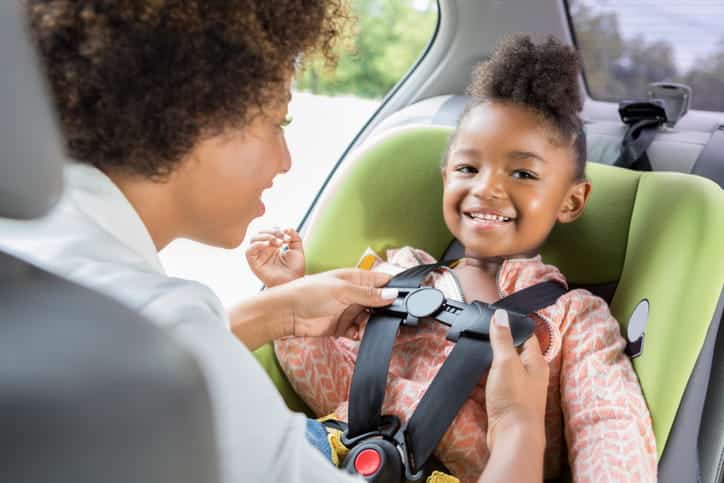All states require children to ride in car seats. However, a state’s specific rule may vary widely based on factors like the child’s age, weight, and height. These laws also vary in specificity. Some states describe in detail the child restraint system needed at each stage of development, while others only give broad guidance.
Florida car seat laws fall into the latter category by including a relatively simple rule that tells you when your child can graduate from a car seat to a booster. However, it does not specify the types of car seats you must use as your child grows or your child’s weight and height for each type.

Understanding these requirements is critical for several reasons. First, car seats are highly effective at preventing child injuries and deaths in car accidents. Second, failing to use a car seat exposes both Florida residents and out-of-state visitors to a fine.
What Are Florida’s Car Seat Laws?
Florida’s car seat law requires drivers to secure all children five years of age and younger in a child restraint device that is:
- Properly used
- Crash-tested
- Federally approved
The term “properly used” is important. Studies show that up to 46% of car seats are misused by drivers who either provide the wrong type for the child or install it improperly. A federally approved and crash-tested car seat will include a label that confirms its certification.
The rules for child restraint systems include the following stipulations:
- Children must ride in a car seat through age three
- Children ages four and five must ride in either a car seat or booster
- Children six or older no longer fall under Florida car seat laws
Even children who are short in stature or lightweight can ride without a child restraint after turning six. However, Florida’s seat belt law takes over at that point, and the child must use a seat belt until their eighteenth birthday regardless of where they sit in the vehicle.
Types of Child Restraints
Child restraint systems fall into three broad categories:
Rear-Facing Car Seat
Rear-facing car seats are designed for infants and toddlers. Children at those ages have relatively weak necks and large heads, and many lack the strength or balance to sit upright.
Rather than sitting up, rear-facing seats allow the youngest children to rest on their backs in a reclined position so the seat can support their heads. They are also positioned with their feet pointing toward the vehicle’s rear, which reduces the odds of the child’s head whipping forward when stopping suddenly.
A rear-facing seat has a five-point harness that holds the child securely over each shoulder, around the waist, and between the legs. This vastly reduces the chances of ejection.
Forward-Facing Car Seat
Forward-facing car seats are designed for older toddlers and preschool-aged children. The seat, backrest, and headrest of this restraint system are integrally formed and sized for the child’s small stature to provide neck and back support.
The seat also includes a five-point harness to hold the child securely. In turn, the child restraint system is attached to the vehicle’s built-in seat using the safety belt or specially formed anchor points.
Booster Seat
Boosters always come with a seat and can also have integrally formed armrests and a seat back. However, boosters do not have their own restraints or harnesses. Instead, they cooperate with the vehicle’s built-in seat belts.
When a child is below a certain height, the lap belt crosses the abdomen, and the shoulder belt crosses the neck. This configuration exposes them to seat belt injuries.
A booster seat helps raise the child so the vehicle’s seat belts properly restrain them during a collision. When resting on the booster, the child is positioned high enough that the lap belt crosses their upper thighs and hips and the shoulder belt crosses their shoulder and chest.
Seat Belts
Seat belts are not a form of specialized child restraint. However, under Florida’s law, they are the only restraints necessary for children aged six through seventeen.
Are There Car Seat Exceptions?
Florida’s law has three exceptions to its requirement for a car seat. A child can legally use a seat belt instead of a car seat in the following situations:
- A non-family member transports the child for free
- Someone transports the child while they experience a medical emergency
- Anyone transports a child with a medical condition that prevents the use of a seat
The first exception applies broadly to carpools, the second to emergencies, and the third to children transported in wheelchairs or otherwise unable to sit in a car seat.
What Are the National Car Seat Recommendations?
Since Florida’s law does not specify which car seats to use at each age, you must look to national recommendations and best practices. According to the National Highway Transportation Safety Administration (NHTSA), children should use rear-facing car seats from birth for at least one year. The NHTSA advises keeping children in rear-facing seats until they exceed these height and weight specifications.
After outgrowing the rear-facing seat, the child graduates to a front-facing one, where they should remain until their size exceeds the seat’s maximum height or weight specification. For an average child, this will happen when they reach about seven years old.
When Can My Child Move to a Booster Seat?
Once the child outgrows the front-facing car seat’s harness, they switch naturally to a booster seat. Since different vehicles have unique seat shapes and sizes, there is no standard booster time. Instead, the child should continue using the booster seat continuously until they are tall enough to fit the seat belt.
Are Drivers Responsible for the Children in Their Vehicles?
Florida law requires adult drivers to properly restrain children in their vehicles. The adult driver will be issued a traffic ticket if a child is not restrained.
An exception applies to chauffeur-driven vehicles like taxis and shuttle buses. In these cases, parents are responsible for supplying child car seats for children under six.
How Can I Be Sure a Car Seat Is Safely Installed?
Child car seats work best when they’re properly installed. Many fire departments and police agencies provide free car seat installations and checks. In Miami, the Miami-Dade Police Department offers this valuable service by appointment only.
When Do Car Seat Laws Not Apply?
Florida car seat laws do not apply to the following vehicles:
- School buses
- Municipal buses
- Charter buses
- Farm tractors
- Large trucks with a gross vehicle weight rating of over 26,000 pounds
- Motorcycles and mopeds
- Bicycles and e-bikes
Drivers do not need to ensure children are secured in car seats when transporting them in these vehicles. However, additional restrictions on carrying child passengers may apply.
How Do Florida Car Seat Laws Apply to Accidents?
Florida uses comparative negligence to allocate fault after car accidents. Normally, any negligence by a victim will reduce the compensation they can recover for their injuries. However, evidence that a driver failed to secure themselves or a child in a car seat cannot be used to prove comparative negligence in any Florida civil case.
What’s the Penalty for a Child Not Being in a Car Seat in Florida?
A citation for failing to secure a child in a child restraint system will result in a fine and three points on the driver’s record. People cited for this violation in Miami can attend the Child Restraint Offender’s Program. Upon completion, the court will reduce your fine and waive assessing points.
Are Car Seat Laws the Same in Each State?
Child car seat laws vary by state. When crossing state lines, you should check local laws to ensure you have complied with the child seat requirements wherever you travel.
Work With Our Car Accident Attorneys in Tampa, FL

If not restrained correctly, your child may face a lifetime of medical care after suffering injuries in a car accident. They may even suffer permanent disabilities that prevent them from earning a living. Without injury compensation, your child may struggle financially. If you have any questions after being in an accident where your child was a victim, contact us today for a free consultation.
Were you injured in a car accident? Contact Jack Bernstein, Injury Attorneys, now.
Sources:
Car Seat Recommendations for Children.
Child’s Car Seat Checks and Installation.
Child Passenger Safety.
FLA. STAT. §316.003.
FLA. STAT. §316.613.
FLA. STAT. §316.614.
Traffic School.
What Does Your State Law Say About Car Seats?
Tampa Car Accident + Personal Injury Lawyers

For more than 40 years, personal injury lawyer Jack G. Bernstein has protected the rights of individuals who have been injured in a variety of circumstances. Throughout his career, Bernstein has been a strategist thoroughly dedicated to the idea of protecting the rights of his clients. Mr. Bernstein is a member of the Florida State Bar Association, the Hillsborough Bar Association and the Clearwater Bar Association.
Mr. Bernstein has the experience and expertise to handle a wide range of injury cases. Among the types of plaintiffs Mr. Bernstein represents are individuals involved in car accidents caused by drunk drivers or other exhibiting negligence, medical complications resulting from carelessness caused by a physician or a medical facility, including brain injury, bicycle, motorcycle, moped and truck accidents, admiralty law and cruise ship accidents, accidental drownings, all types of wrongful death lawsuits, along with most injury, catastrophic occurrences and legal malpractice issues.
Our firm handles every type of personal injury and accident case, using negotiation and litigation tactics effectively. We handle cases throughout Tampa, Sarasota, St. Petersburg, and Clearwater, FL. With a staff of approximately 40 people, including six lawyers and 34 support personnel, we have the legal resources to get the justice you deserve and the maximum recovery for your losses. Schedule your free consultation today; we are always here to help.
Free Case Evaluation
No Fees Unless We Win
No upfront fees, no risk, and no out of pocket cost to you or your family.
Entirely confidential – we respect your privacy, consultations are privileged.
